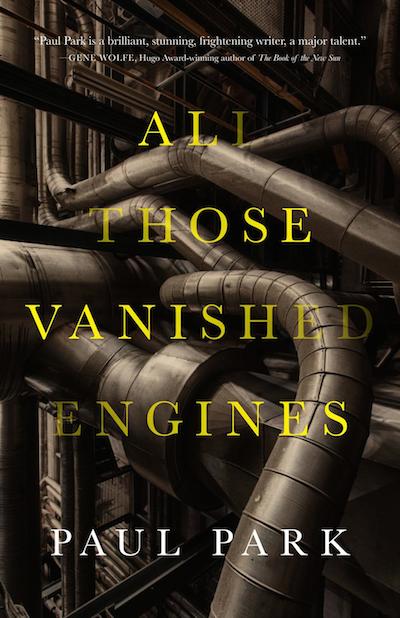Paul Park’s latest novel, All Those Vanished Engines, is nothing if not ambitious. Part family history, part science fiction, the whole thing weaves together into one surreal metafiction.
The novel is separated into three parts. The first part, “Bracelets,” is set in an alternate version of post-Civil War Virginia where North and South are still divided and the Yankee forces are led by a Queen of the North. We start out seeing the world through the eyes of Paulina, a young woman who is writing a story about the future, about a war with Martian forces and a boy named Matthew. As the chapters progress, alternating between Paulina’s time and her fictions, the lines begin to blur and suddenly it seems maybe Paulina is the fiction as both stories bleed into each other. The result is something surreal and dreamlike and sets up the tone for the rest of the novel.
The second part, “Three Visits to a Nursing Home,” focuses on a narrator who is almost definitely Paul Park (or rather, a fictionalized Paul Park), and begins with an art installation created by Stephen Vitiello based on a piece written by Park also named All Those Vanished Engines (these kinds of contorted connections are found throughout the book). Stories and machines abound in this section which deals with Park’s family and in which he is both the narrator and a character in others’ stories. There is also a mystery of a secret WWII sound device as told (always stories within stories) by an old blind man in a nursing home.
Finally, the last part of the book, “Ghosts Doing the Orange Dance,” deals with a fictionalized Paul Park in the future. Park references his earlier books here as well as works written by his family members and ancestors. Threading through it is the mystery of a death in an old Park family house and a series of dreams and/or images involving ghostly figures assembled into a kind of army.
Unreliable narrators abound in this novel. In some cases this is because the character turns out to be a fiction themselves, and so the reality they perceive is just part of a bigger story. Other times it’s just the narrator willfully misleading the reader. After one chapter focused on (and named after) a certain character, the narrator admits that she wasn’t really there and was nothing more than a “confabulation.” As factual and grounding some of the details are (Park’s writing of a Forgotten Realms book, for example), there are just as many that feel nebulous. Still, these islands of stability help anchor the reader and bring them through.
I can’t help but feel that one of the keys to the novel is explained in the work itself. In Part Two, the narrator says:
Third, I thought you could build a story that would function as a machine, or else a complex of machines, each one moving separately, yet part of a process that ultimately would produce an emotion or a sequence of emotions. You could swap out parts, replace them if they got too old. And this time you would build in some deliberate redundancy, if only just to handle the stress.
It seems to describe this novel quite well – a series of parts that each move separately but with redundancies and connections, resonances and echoes, but all for emotional effect. And that seems to be the point. There is a plot here, but its resolution seems an almost secondary goal; instead, evoking an emotional response from the reader seems to be the ultimate goal.
All Those Vanished Engines is a truly fascinating book, and its dreamlike quality helps give it layers and depth that reminded me of the work of Gene Wolfe. It’s the kind of novel that seems like it would reward multiple readings and endless discussions of interpretation on message boards. Its one weakness, however, is that there is no one revelatory moment, no unifying climax that brings everything together. Instead it ends with just the connections and layers it established, which may leave some readers feeling like something is missing.
Still, just in revisiting the book for this review, I found myself discovering new connections that I hadn’t seen before and though it’s rare for me, I’d like to go back and reread it soon to see what becomes apparent the second time. Unlike dreams, books can always be revisited.
All Those Vanished Engines is available now from Tor Books.
Read an excerpt from the novel here on Tor.com
Rajan Khanna is a writer, narrator, and blogger who lives in Brooklyn, NY. His first novel, Falling Sky, a post-apocalyptic thriller with airships, will be published in October 2014 by Pyr Books.










